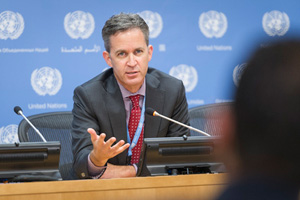【人權訊息】見解和言論自由Freedom of opinion and expression(聯合國人權事務高級專員辦事處Office of the High Commissioner for Human Rights)
任務授權
人權理事會第7/36號決議授權該特別報告員:
(一)收集一切有關侵犯尋求行使或增進行使見解和言論自由權的人的見解和言論自由權、對他們歧視、威脅或使用暴力、進行騷擾、迫害或恐嚇的資料,無論情況發生在何處,包括作為一個高度優先事項,對記者或新聞領域其他專業人員的此類行為;
(二)從政府、非政府組織和了解這類情況的任何其他方面查詢和接受可信和可靠的資料並對之作出回應;
(三)就如何更好地增進和保護一切表現形式的見解和言論自由權提出意見和建議;
(四)為聯合國人權事務高級專員辦事處提供的技術援助和諮詢服務作出貢獻,以更好地增進和保護見解和言論自由權。
工作方法
為履行其任務,特別報告員:
(一)轉交涉嫌侵犯見解和言論自由權利的緊急呼籲和指控函至各會員國。該特別報告員會匯總這些來文以及所收到的各國政府的答复,並反映在向人權 理事會提交的年度報告中(見個人投訴)。
(二)進行實況調查國家訪問。
(三)向人權 理事會和聯合國大會(後者自2010年起)提交涵蓋與其任務相關的各項活動的年度報告。
年度報告 Freedom of Opinion and Expression - Annual reports
http://www.ohchr.org/EN/Issues/FreedomOpinion/Pages/Annual.aspx
Special Rapporteur on the promotion and protection of the right to freedom of opinion and expression
A Special Rapporteur is an independent expert appointed by the Human Rights Council to examine and report back on a country situation or a specific human rights theme. This position is honorary and the expert is not United Nations staff nor paid for his/her work. The Special Rapporteurs are part of the Special Procedures of the Human Rights Council.
For more on Special Rapporteurs, please refer to Fact Sheet N° 27: Seventeen Frequently Asked Questions about United Nations Special Rapporteurs.
Historical Background
In 1993, the United Nations Commission on Human Rights established the mandate of the Special Rapporteur on the promotion and protection of the right to freedom of opinion and expression.
After replacing the Commission on Human Rights, the Human Rights Council decided to extend the mandate for another three years in its resolution 7/36 of March 2008. The mandate was renewed again in March 2011 for a further period of three years (HRC resolution 16/4).
On 27 March 2014, the Human Rights Council extended the mandate of the Special Rapporteur for a further period of three years (resolution 25/2).
David Kaye has been appointed UN Special Rapporteur on the promotion and protection of the right to freedom of opinion and expression in August 2014.
Mandate
The Special Rapporteur is mandated by HRC resolution 7/36:
(a) To gather all relevant information, wherever it may occur, relating to violations of the right to freedom of opinion and expression, discrimination against, threats or use of violence, harassment, persecution or intimidation directed at persons seeking to exercise or to promote the exercise of the right to freedom of opinion and expression, including, as a matter of high priority, against journalists or other professionals in the field of information;
(b) To seek, receive and respond to credible and reliable information from Governments, non-governmental organizations and any other parties who have knowledge of these cases;
(c) To make recommendations and provide suggestions on ways and means to better promote and protect the right to freedom of opinion and expression in all its manifestations; and
(d) To contribute to the provision of technical assistance or advisory services by the Office of the United Nations High Commissioner for Human Rights to better promote and protect the right to freedom of opinion and expression.
Working methods
In the discharge of his mandate the Special Rapporteur:
a) Transmits urgent appeals and letters of allegation to Member States on alleged violations of the right to freedom of opinion and expression. The Special Rapporteur summarises these communications as well as replies received from Governments in an annual report submitted to the Human Rights Council (See Individual Complaints).
b) Undertakes fact-finding country visits.
c) Submits annual reports covering activities relating to the mandate to the Human Rights Council and to the General Assembly (starting in 2010 for the latter).


